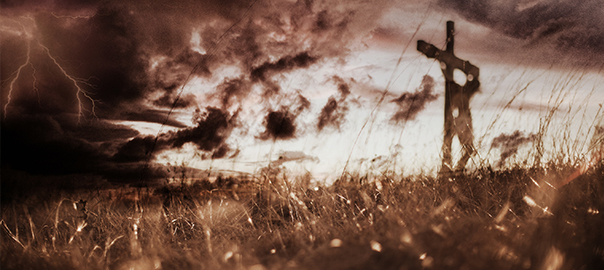Easter is my favorite holiday. I mean, I love Christmas…but to be honest, trying to balance “keeping Christ in Christmas” with all the cultural baggage of the holiday leaves me completely exhausted.
But not Easter. Somehow, within the confines of my own mind and home, I’ve managed to protect Easter from being sabotaged by bunnies and eggs and mountains of candy. It’s possible I’ve been a little too fierce in my determination to keep Christ in Easter. A few years ago, my three- and-five-year olds were playing chase around the house. As they ran from invisible dangers, they shouted:
Look out! Bad guys!
Monsters!
OH NO! It’s the Easter Bunny!! RUUUUUUUUN!!
So yeah, I maybe more-or-less taught them that The Bunny is in league with Satan. I regret nothing. They’ll probably all need therapy, but at least they’re clear on this: Easter is about Jesus’ crucifixion and rising from the dead.
Which brings me to the next question…So what? He died. He rose. But why? What does Easter mean for me, today, with my messy house and kids with homework and bills to pay…and millions crowded into refugee camps and violence and corruption and children going to bed hungry?
I grew up in church. I know the Sunday school answer to “Why did Jesus die?” is a firm and resounding, “To save us from our sins!”
And that’s true. But it’s not the whole truth. The whole gospel requires us to start at the beginning, with a loving Creator making all things. And everything was good. And He made people to be in relationship with Him, with each other, and with creation.
We all know what happened next. Adam and Eve couldn’t keep their hot little hands off the forbidden fruit. And they broke everything. In Genesis 3, right before they leave the garden of God’s presence forever, God explains the consequences of sin in the world: birth will be hard, marriage will be hard, work will be hard…Thorns and weeds—pain and ugliness—will run rampant. Everything will be tainted by evil. Death will take over.
That’s what sin does. That’s what we need saving from.
So Easter is about Jesus saving us from our sin. And it’s about Him taking back what sin stole, breaking the power of death, and restoring our relationships with Himself, each other, and creation. Colossians 1:19-20 says, “For God was pleased to have all His fullness dwell in Him [Jesus], and through Him to reconcile to Himself all things, whether things on earth or things in heaven, by making peace through His blood, shed on the cross.”
“Wholism” simply means realizing the whole gospel and its implications for our lives today. The whole gospel shows us that the world doesn’t consist of “spiritual” things and “physical” things. Rather, all things are God’s things. He made them, He cares about them, and He died to reconcile them. It reveals that a relationship with God is more than “fire insurance.” Our relationship with God is meant to restore every part of our lives to His good design. Everything we do, think, and say is meant to be an act of worship.
Wholism is good news for all of us, but especially for those who are most vulnerable. The whole gospel tells us that God cares about and has solutions for sickness, malnutrition, lack of clean water, injustice, oppression, and every problem that we face. This month, join us in praying that the Church around the world will understand the whole gospel, and that we will bring every area of life and society under the lordship of the risen Christ.



Leave A Comment